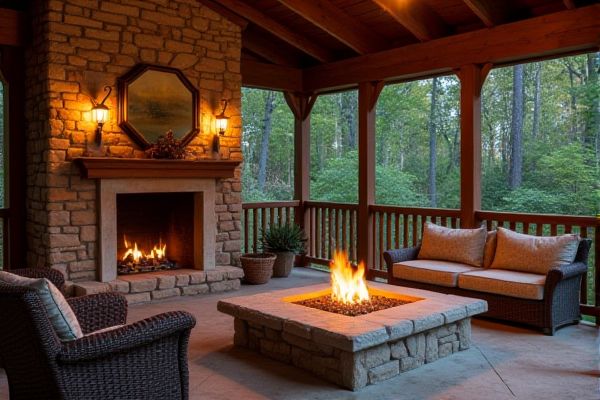
A porch heater provides consistent, controlled warmth ideal for extended outdoor gatherings, while a fire pit offers ambiance and a natural flame but less uniform heat. Explore this article to determine which option best suits your outdoor space and comfort needs.
Table of Comparison
| Feature | Porch Heater | Fire Pit |
|---|---|---|
| Heat Source | Propane, electric, or natural gas | Wood, propane, or natural gas |
| Heat Output | Up to 48,000 BTU | Up to 100,000+ BTU |
| Usage Area | Covered porches, patios | Open outdoor spaces |
| Portability | Generally portable | Varies: portable to fixed |
| Installation | Minimal, plug or connect gas | Requires safe placement, may need foundation |
| Maintenance | Low; occasional cleaning | Medium; ash removal, firewood storage |
| Ambiance | Functional, minimal flame | Warm, natural flame aesthetics |
| Safety | Enclosed flame, safer for covered areas | Open flame requires caution |
| Cost Range | $100 - $700 | $200 - $2,000+ |
Introduction to Porch Heaters and Fire Pits
Porch heaters and fire pits provide effective outdoor heating solutions, each offering unique benefits for backyard comfort. Porch heaters, typically powered by propane or electricity, deliver consistent and controllable warmth ideal for enclosed or semi-enclosed spaces. Fire pits create a cozy ambiance with an open flame, often fueled by wood or gas, perfect for social gatherings and outdoor aesthetics.
Key Differences Between Porch Heaters and Fire Pits
Porch heaters use propane or electric power to provide consistent, controllable heat ideal for small, covered spaces, while fire pits burn wood or gas and offer an open flame that creates ambiance and warmth in larger, open areas. The safety features of porch heaters, such as automatic shut-off, make them suitable for enclosed porches, whereas fire pits require proper ventilation and caution due to sparks and smoke. Your choice depends on whether you prioritize steady heat and safety or the rustic charm and social atmosphere of an open fire.
Heating Efficiency Comparison
Porch heaters typically offer higher heating efficiency by providing consistent, directional warmth ideal for close-range comfort. Fire pits emit radiant heat that warms a broader area but with less control and variable efficiency depending on fuel type and design. Your choice depends on whether you prioritize concentrated heat output or ambient warmth for larger gatherings.
Safety Considerations for Outdoor Heating
Porch heaters offer controlled heat with built-in safety features such as automatic shut-off mechanisms and stable bases, reducing risks of fire or burns compared to fire pits. Fire pits, while providing a natural flame ambiance, require constant supervision, proper ventilation, and clear surroundings to prevent accidental fires or carbon monoxide buildup. Selecting outdoor heating should prioritize ignition source control, proximity to flammable materials, and adherence to local safety regulations.
Installation and Setup Requirements
Porch heaters typically require electrical or propane hookups, making their installation straightforward with minimal setup, often needing just proper ventilation and a stable surface. Fire pits demand more careful site preparation, including choosing a fire-resistant location, ensuring clearance from flammable materials, and sometimes constructing a base with non-combustible materials such as stone or gravel. Both options require adherence to local safety regulations and clearance guidelines to prevent fire hazards and achieve optimal performance.
Fuel Types and Energy Consumption
Porch heaters typically use propane, natural gas, or electricity, offering consistent heat output and lower energy consumption for prolonged use. Fire pits mainly rely on wood or propane, with wood producing more particulate emissions and varying heat intensity, while propane fire pits provide cleaner, more controlled flames but consume more fuel per hour. Understanding fuel types helps users balance efficiency, cost, and environmental impact when choosing between a porch heater and a fire pit.
Cost Analysis: Initial and Ongoing Expenses
Porch heaters typically have lower initial costs, ranging from $100 to $500 depending on the model, while fire pits can vary widely from $200 to over $1,000 based on materials and design. Ongoing expenses for porch heaters include propane or electric bills, averaging $20 to $50 per month, whereas fire pits require regular wood or propane fuel purchases, which can cost around $30 to $70 monthly. Your choice should consider both upfront investment and maintenance costs to optimize long-term budget efficiency.
Design and Aesthetic Considerations
Porch heaters offer sleek, modern designs with compact profiles that seamlessly integrate into covered outdoor spaces, providing consistent warmth without overwhelming decor. Fire pits serve as striking visual focal points with rustic or contemporary styles, creating a cozy ambiance through open flames and dynamic light patterns. Choosing between the two depends on balancing aesthetic preferences with spatial constraints and desired atmospheric effects.
Environmental Impact and Emissions
Porch heaters typically rely on propane or natural gas, producing fewer particulate emissions compared to traditional wood-burning fire pits, which release higher levels of carbon dioxide and particulate matter. Fire pits contribute to air pollution through smoke and unburned hydrocarbons, negatively impacting local air quality and increasing your carbon footprint. Choosing a porch heater can reduce your environmental impact by limiting harmful emissions and improving air quality around your outdoor space.
Choosing the Best Option for Your Outdoor Space
Porch heaters provide consistent, targeted warmth ideal for small to medium outdoor spaces, while fire pits offer a cozy ambiance and are perfect for social gatherings. Your choice depends on the size of your outdoor area, desired heat output, and whether you prioritize functionality or atmosphere. Consider factors such as fuel type, safety, and maintenance to select the best option for comfortable, year-round enjoyment.
 homyna.com
homyna.com